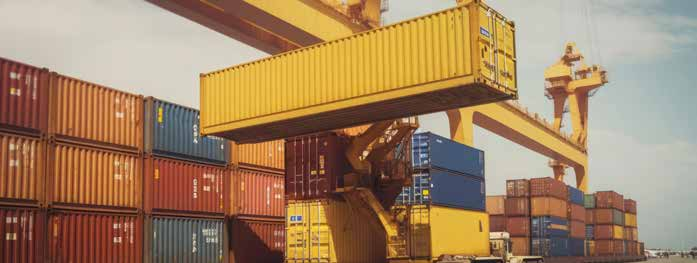Spotlight
RBI proposes to rationalise the FEMA guidelines relating to imports and exports. The draft proposals have been put up in public domain. RBI is looking forward to receive comments/feedback on these via email by September 01, 2024, with the subject line “Feedback on draft regulations and directions on export and import under FEMA”. Members are requested to study these and respond.
Introduction of a unified export declaration form, bringing service exports at par with goods exports from regulatory perspective, harmonising rules for exports and imports [earlier master direction on imports had over 10,000 words and that for exports over 15,000 words], removal of ceiling on import payment settlement period, almost complete delegation of powers to AD banks with their own Board approved policies to exercise, are the main highlights of the proposed change.
There will be curtailment of certain facilities. E.g. discontinuation of self write-off of export receivables even by status holder exporters, reduction in realisation period from 15 months to 9 months in case of exports to warehouses abroad, removal of RBI prescribed exemption from export declaration for small value sample exports etc.
As part of latest monetary policy statement, RBI Governor stated on 7th June that in view of the changing dynamics of international trade and in line with the progressive liberalisation of foreign exchange regulations, it is proposed to rationalise the extant FEMA guidelines on export and import of goods and services. This will further promote ease of doing business and provide greater operational flexibility to Authorized Dealer banks. The stakeholders viz.: importers and exporters were accordingly looking forward to the expected rationalization in the rules relating to cross border trade in goods and services. RBI published the draft regulations under FEMA and directions to Authorised Dealer banks on 2nd July 2024 for public response, seeking comments/ feedback within two months. This is a subject of immense importance to all those involved in or connected with imports and exports of both goods and services, whether new or established entities and irrespective of being large business houses or small online traders. As the subject line indicates, RBI proposes to harmonize the rules for both imports and exports and those for goods and services. Thus, it islikely to be of relevance to all such related parties.We shall examine the proposed changes from the perspective of importers/exporters, banks and conceptual generic changes, though it should be clearly realized that the three views are highly intertwined.
DEPENDENCE ON IMPORTED INPUTS
A common export declaration form is being introduced irrespective of mode of shipment, type of port and underlying export. Further, the exports ofservices and software are being brought on par with export of goods from regulatory perspective. Export on lease basis will not be considered as a separate class. Advance payment made or received, for import or export of goods and services which do not result in any import or export even within the due date or extended time granted by the Authorised Dealer or when the advance is not refunded thereafter would be treated as if they areforeign currency borrowing and lending. Many of the discretions to be exercised by banks are to be as per internal policy to be framed by the banks e.g. accepting export documents, condoning delay in their submission ordelay in import settlements etc. The comprehensive board approved policy should be well-documentedand conducive to international trade. This of course could result in marginal changes in the procedures adapted by different banks, customer choices & complaints and regulatory observations. Banks are given six months’ time from the date ofissuance of the new circular for framing such all-encompassing Board approved policy document which shouldalso include the procedure of adhering to the new discretions being given to the bank. That date itself could vary from bank to bank!It will be interesting to know how RBI proposes to prescribe the authority for exercising such powers till such policy is announced by the banks, by introducing suitable grandfathering clause. The transition clause mentioned in the Regulation leaves the duration between date of new circular and the finalization of Policy by the bank, uncovered.
CHANGES AFFECTING BANKS
The introductory para in the existing master direction on imports to the banks highlighted the need to adhere to foreign trade policy, UCPDC, R & D Act, Income Tax Act etc. Master direction on exports similarly begins with reference to foreign trade policy etc. However, the new policy will commence by asking banks to facilitate payments for export and import of goods and services. Apparently, the ethos has changed, that too with all the additional discretionary powers.
Banks have to certify, on the basis of exporter’s declaration [the form itself has an error in para 5 in citing who has signed at para 4], that the services described and the export value declared by the exporter in the form is as per the corresponding invoice.When the bank is not a party to the services offered and its valuation, the probity of such blind certification is questionable.
Banks are now required to enter the document details in the EDPMS or IDPMS system on the day of receipt of documents itself, even though banks may take five banking documents for scrutiny of export documents under any LC for negotiation as per UCPDC.
A trivial relief for banks is that certain superfluous requirements of banks requiring to advising customers [e.g. advising importers to comply with Income Tax Act or asking exporters to surrender proportionate export incentives while allowing reduced export realisations] will be thankfully omitted.
The most challenging immediate task for banks will be to frame within six months, a comprehensive non-discriminatory, well-documented, international trade-conducive policy that defines clear internal-delegation structure for handling [or rather facilitating] payments relating to imports and exports. It has to have granular procedural details on all areas where RBI willrescind its involvement in the banks’ international trade related work.
CHANGES AFFECTING MERCHANTS
[I.E. IMPORTERS AND EXPORTERS]

Presently import payments are to be settled within a period of 6 months from the date of shipment[except ifwithheld towards guarantee of performance, deferred imports of capital goods (3 years) and import of books (no time limit)]. Now the duration will be decided based on contractual terms between Indian importer and overseas seller. Surprisingly, there is no cap or safeguard limit. Export payments are to be presently received within 9 months from the ‘date of export’ except that it will be 15 months for shipment to a warehouse abroad. In future it will be uniformly 9 months from the ‘date of shipment’. The specific words used to qualify the date made difference, if the ‘onboard’date was different, leading to occasional regulatory comments and audit observations. The longer duration for warehouse shipment has been omitted. Where there is delay in realization of export proceeds for reasons beyond control of exporter, bank’s policy should lay down the guidelines for extension. There are no RBI restrictions of 6 months at a time etc., as earlier. In case of imports, bank’s policy should provide for granting extension for delayed settlement of payments beyond the contractual terms. As of now, it looks like banks have to decide on the merits of such requests for extension.
There is a single export declaration form [EDF], irrespective of the port of shipment and covering goods, services and software. In other words, service exports are now brought under export declaration discipline. Date of invoice will be the equivalent of date of shipment in their cases. SOFTEX form will get discontinued. However, in the directions to banks, there is still reference to shipping bills being submitted. Permission for waiver of export declaration forms for sample or small value exports has been omitted, which hopefully is by oversight and will be continued.Or, may be, banks are expected to form guidelines on these also. Though there is no mention of Bill of entry specifically, there is reference to it twice in the direction to banks viz.: need to follow up documentary evidence relating to pertaining to import transactions and entering details of specifically bill of entry in IDPMS.
Reference to the ceiling of [erstwhile] LIBOR plus 1% on interest payment and one year in case of advance received for exports [either exporting or refunding] will be omitted. While banks can permit extension, any outstanding beyond that will be treated as external borrowing including for interest ceiling [viz.: all in cost ceiling will apply]. No bank would displease good exporters and hence there could be evergreening to cover up the delay. RBI had permitted banks to allow exporters to receive long term export advances [upto ten years] subject to long list of conditions. This is now subject to bank’s discretion; and most probably, banks will continue with the same conditions in the initial years. In case of advance payments to be made for imports, there were sectoral quantitative ceilings, which are not continued. Banks have to decide on these, as part of policy.

Set-off of export receivables against import payables can be currently allowed by banks subject to long list of conditions prescribed by RBI. Of these, two conditions viz.: payables in respect of the same counterpartiesonly allowed and no set-off of export receivables for goods against import payables for services and vice versa, are retained. Banks have fuldiscretion otherwise if satisfied that such requests are legitimate and justifiable. Interestingly, counterparties in ACU countries are no more excluded – a major geopolitical decision. While RBI always prefers financial year as the standard for guidelines, for this set-off, there was a condition of both transactions being in the same calendar year, creating avoidable inconvenience for year-end transactions. Thankfully, this ceiling duration of one year itself is being deleted.
Reduction in realizable value of export proceeds due to discounts offered or nonpayment was earlier allowed on a graded scale, by the exporter [self write-off], banks or RBI. There were conditionalities like whether settled by ECGC, merit-criteria, status of the exporter, age of the receivables etc. The new direction does not even use the word write-off. All reductions in export realizations [upto 100%] can be permitted by banks, after satisfying themselves of the bona fides of such requests. The concept of self write-off will no longer exist [even for export status holders]. There will be no reference to RBI for such cases. Though may not be intended, this will mean RBI’s confidence in banks has increased tremendously and that in exporters has vanished. All cases of reductions of more than 25% in the full export value of exports to be placed beforebank Board for post facto ratification. In the absence of any floor amount, even small value export write-offs need to be placed, if the write-off is over 25%.
In Merchanting Trade, RBI has correctly absolved itself of commercial considerations like merchanting trade must be profitable, commission paid [allowed only] with bank’s permission should not result in loss etc., by omitting such clauses. The cash flow gap is being increased from 4 to 6 months. Overall completion period of 9 months will be omitted.
When the comprehensive EDPMS system was introduced, the exporters were automatically caution listed by the system, based on built in parameters. Due to representations and disputes, this was modified and RBI did it on specific recommendations from the concerned bank, based on defined exceedings. Under the new rules, this has been delegated to banks,if an export amount [no floor value] is overdue for more than two years after giving an opportunity to exporter of being heard. De-caution listing is mandatorily to be done by banks if all outstanding export bills are realized. RBI perhaps will correct this provision to say all “overdue outstanding export bills”.

Banks have to ensure FEMA compliance prior toany export arrangement for export of goods or services on deferred payment terms or in execution of a turnkey project or a civil construction contract. Since APDIR circular 11 of 22.7.2014 will be superseded, the banks have a lot on hand to frame guidelines in this not so bank-conversant area. When the concept of project export finance was introduced decades ago, there was a Working Group to approve. With experience gained, there werethen delegated powers with Exim Bank in the fulcrum depending on the size of the project export. There was initially a need to obtain in-principle approval even before submitting bids, which was waived subsequently. Now Banks appear to be the sole authority for the approval. As per the proposed regulation, “the exporter shall, before entering into any such export arrangement” obtain prior approval of the bank. It is not clear whether this means even pre-bid approval; which if someans, is a retrograde step. And banks surely are ill equipped to decide on this in the briefduration that will be available for submitting bids.
There are a number of practical issues which were granularly dealt with and banks guided, byRBIso far,but proposed to be omitted. If the intention of RBI is that these will be within the discretionary domain of banks, it is better that RBI confirms so. Just a few examples include:
- There is no specific light thrown on possible payments to or receipts from, a third party for the imports or exports done.
- Banks are expected to give pre-clearance [perhaps at pre bid stage itself] to participation in project exports. Banks’ own expertise, involvement and interest in this is very limited. The existing project export memorandum is proposed to be superseded, leaving the banks to develop similar own document.
- Where decisions are to be taken by banks in future with its own guidelines, there could be bias, customer pressure, lack of expertise etc. E.g. where there is dispute between Indian importer and foreign supplier and if extension of time is sought for payment.
In a number of situations like requests for write-off of export receivables, placing a customer on caution list etc., there could be dispute or difference of opinion between bank and customer. Since Bank will now be the final decider on these, it will amount to litigant becoming also the judge. This may not be a legally tenable position and a third party like RBI or atleast an SRO may have to be introduced to resolve.
However, not withstanding these minor procedural improvements needed, overall, this is a very positive, progressive, prudent andplucky step by RBI. Nudging the banks to move from compliance role to facilitation phase speaks volumes of the long sightedness of the regulator. Banks may have to shore up their manpower both in number and forex expertise at branches handling such business. If RBI remains magnanimous in condoning procedural lapses and customers tolerate, during the transition period, this change will be a great fillip to Country’s export promotion efforts.















